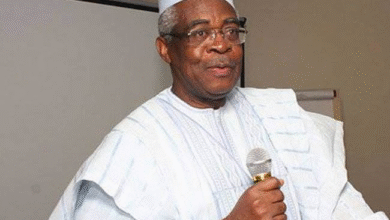President Bola Tinubu and the Ides of Time: What a Difference A Year Makes

“If you have built castles in the air, your work need not be lost; that is where they should be. Now, put the foundations under them.” – Henry David Thoreau
This scorecard report appraising the 1-year President Tinubu Administration: What a Difference A Year Makes is presented under the following heads:
- Introduction
- Policy Plans, Actions Taken/Reforms, and Impact/Status
- Performance Appraisal using the ‘custom’ PESTELS Analysis
- Macroeconomic Scorecard – What a Difference a Year Makes
- Sectoral Growth
- Household Realities
- Closing Thoughts and Outlook
Introduction
“Renewed Hope” was the expectation given to Nigerians when Bola Ahmed Tinubu took his oath of office approximately a year ago as President of the Federal Republic of Nigeria. In the Tinubu administration’s inaugural year in office, several policies, often described as “bold and daring” policies have been initiated. These policy initiatives have been particularly noteworthy considering the nation’s unique challenges at the onset of the new administration. Notably, international entities such as the International Monetary Fund (IMF) and World Bank have endorsed and backed the Tinubu administration’s policies, emphasising their long-overdue nature.

With sights set on very ambitious targets, the Tinubu administration went into action from the moment the president mounted the podium to give his speech as the president of Nigeria. It seems the objectives and goals were simple, but after one year in office and given the outcomes, it may seem that a chain of mixed reactions has formed, trailing the competence and the ability of the government to deliver on the promise of renewed hope. A review by our analysts combs through the policies, actions, and outcomes of President Tinubu’s administration in the last twelve months.
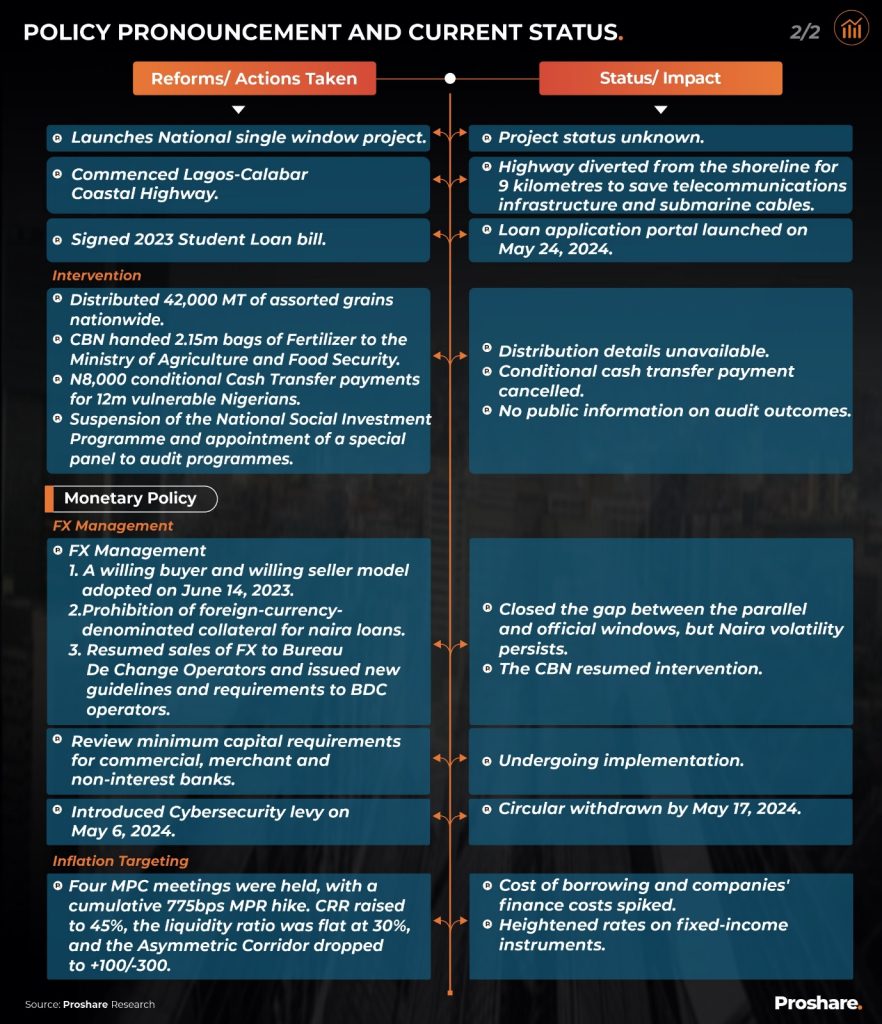
Policy Plans, Actions Taken/Reforms, and Impact/Status
Right from President Tinubu’s inaugural speech, policies and actions commenced. The President’s pronouncements elicited swift, targeted, but not necessarily expected results. Market liberalisation, though desirable, had its drawbacks, many unanticipated. A neoclassical monetary policy approach prompted the Central Bank of Nigeria (CBN) to return to a policy of inflationary targeting to shake off severe upward price pressures, threatening to dissimate household incomes. In trying to contain inflation, the CBN was stuck in an ‘impossible trinity’ where a liberal exchange rate prevented policy autonomy or independence. Raising domestic interest rates to attract foreign capital and bring down the exchange rate meant that the CBN could no longer ‘target inflation, which is a function of the money supply in the short term.
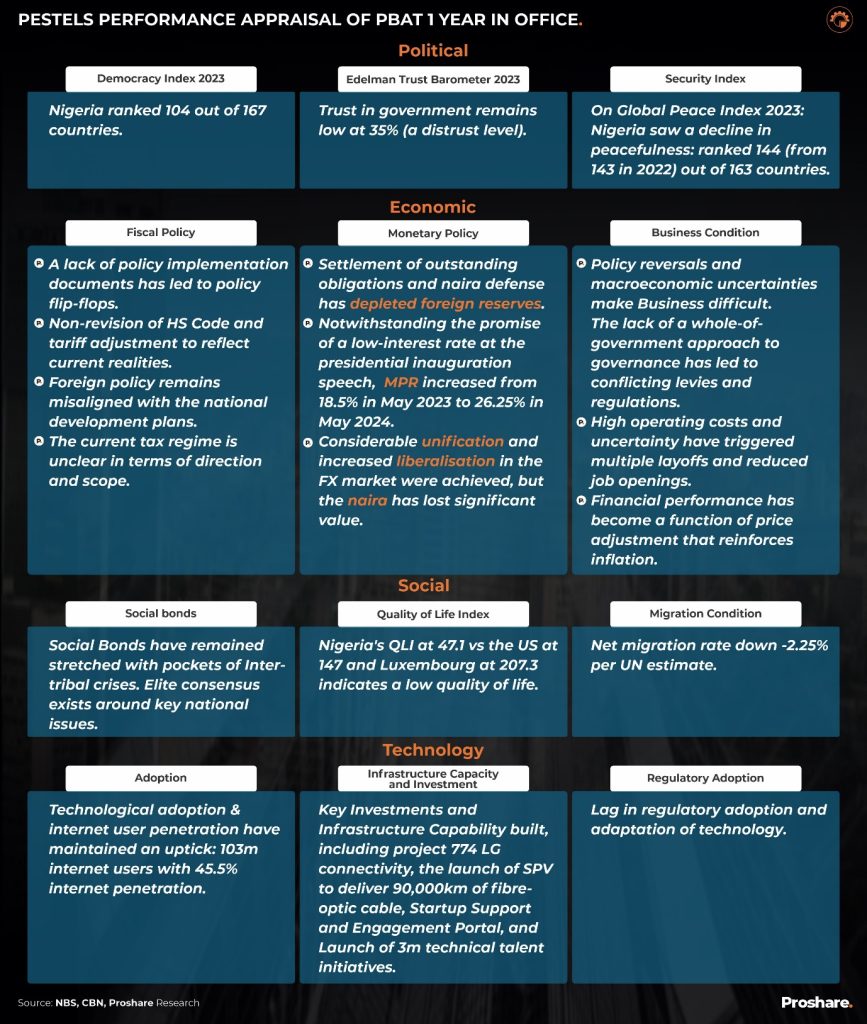
However, more importantly, instability in the foreign exchange market meant that the CBN could not assure stability in the domestic market without improving Nigeria’s foreign reserves. Tinubu’s policy reforms have been well-intended but inadequate; a weak ‘A-whole-of-government’ approach to policy coordination has dampened the impact of some of the government’s laudable initiatives. The poor coordination and improper policy alignments have generated unattractive outcomes, worsening key macroeconomic indicators. Some policy reversals were to lessen the impact, but other policies may lead to positive future outcomes.
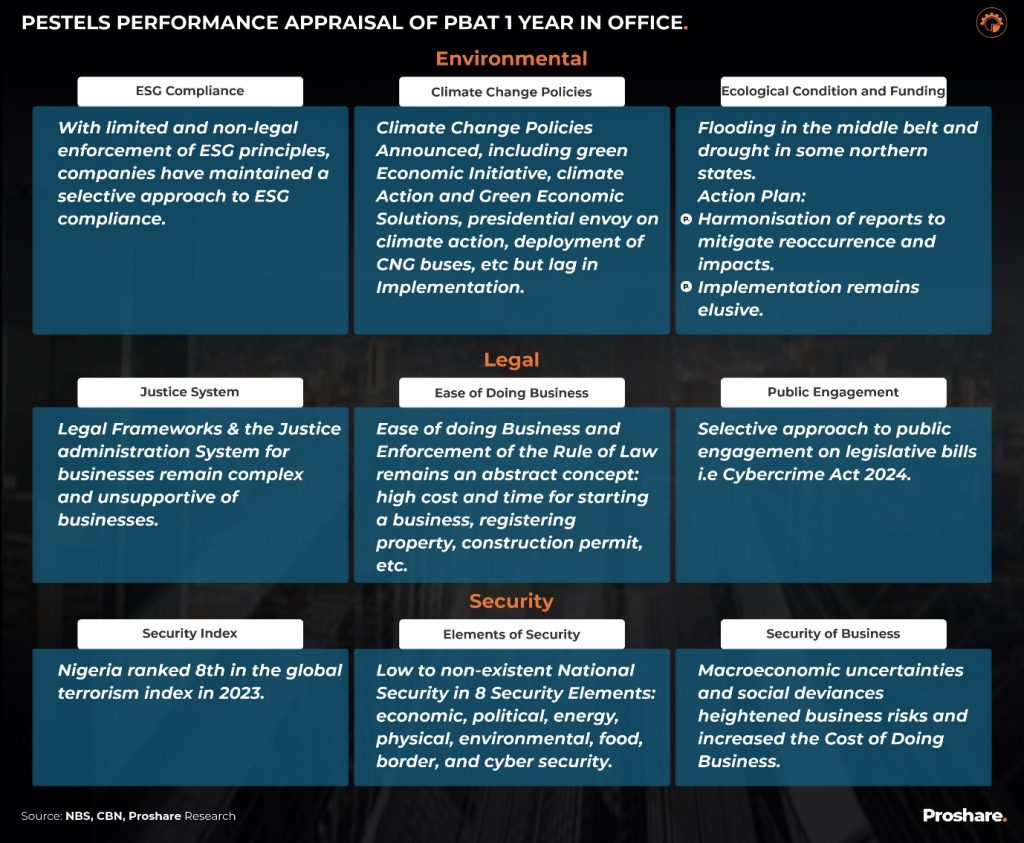
We can and should do better. The problem with Nigerian (and perhaps foreign) politicians is that they see the answers to society’s problems as binary – ‘yes’ or ‘no’. Usually, as pointed out by Patrick Bet-David, answers to socioeconomic problems are a series of sequenced moves to achieve a clear objective. So far, the administration’s objectives have been fuzzy, and this makes the policies, programs, and projects in the economic plans serially compromised and somewhat lacking buy-in from the public, opening it to being considered inappropriate rather than simply misunderstood.
Performance Appraisal using the ‘custom’ PESTELS Analysis
A PESTELS approach was adopted to provide a comprehensive overview of Tinubu’s administration’s performance during its first year in office
Macroeconomic Scorecard – What a Difference a Year Makes
Sectoral Growth
The major aim of the renewed hope agenda is fostering growth by ensuring that various sectors that make up the economy are paid adequate attention and measures that would be taken will strengthen their contribution and not weaken it. Since various measures have been implemented by the governing authorities in this one year, it is, however, germane to investigate how each sector performed from the lens of their contribution to the Gross Domestic Product (GDP) in fostering economic growth (see chart 1 below).
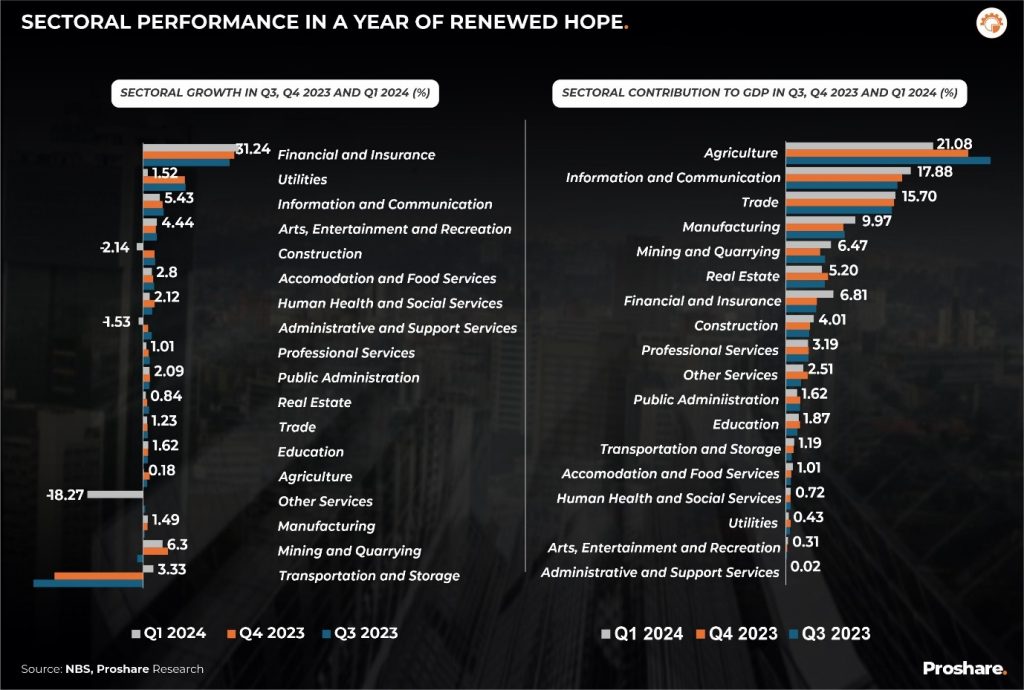
- Agriculture has the highest contribution to GDP both in Q3 and Q4 2023. The Sector, however, ranked amongst the lowest growth sectors – an indication of the food supply challenges in the country.
- The sectoral growth of Agriculture declined in Q4 2023, which made the agriculture sector the 14th in sectoral growth.
- The Information and Communication sector ranked 2nd in its contribution to the GDP and maintained a high growth rate amongst other sectors, which is 3rd.
- The financial and Insurance sector is ranked the 7th sectorial contributor to the GDP but is leading in sector growth.
- Growth in the transportation and storage sector declined. However, it is ranked 13th in sectoral contribution to GDP.
- Utilities showed a promising hold in the sectors as it ranked 2nd in growth despite being the 16th contributor to the GDP.
- Sectors like Agriculture, manufacturing mining, quarrying, Human Health, and Social Services did below their contribution in Q3 2023 amidst other sectors.
- ICT, trade, Mining, manufacturing, real estate, and real estate sectors were among the contributing sectors to GDP. Diversification into these sectors remained low as the nation remained dependent on oil revenue.
- Growth gradually waned across sectors in the economy in all three quarters over the past year.
Household Realities
The households, constituting the voting populace, were left with mixed sentiments and questions on whether a competent government had come to power when the Tinubu administration emerged.
Supporters of the leading party believed that the emergence of their candidate was the solution to Nigeria’s challenges, and renewed hope was what the nation needed. It was what President Tinubu promised Nigerians from the day of oat in office. On the other hand, opposition party supporters have asked if there was a hope to renew in the first place while suggesting that the Tinubu administration ought to create grounds for households to have hope of which will be renewed in the years to come. Tinubu’s one year in office came with numerous policies aimed at alleviating the challenges faced by households (See table 2 below).
Table 2:
Available data suggests that, in approximately a year of the Tinubu administration in office, the government’s motives and series of policy rollouts and actions to renew Nigerians’ hope have produced outcomes less than household desired expectations (see chart 2 below).
Chart 2:
- The ability to afford a healthy meal became increasingly difficult for households in every month of Tinubu’s one year in office.
- Food insecurity increasingly became a challenge throughout Tinubu’s one year in office as food inflation surged from 24.08% in May 2023 to 40.53% in April 2023.
- About 53% of Nigerians are considered poor and face malnutrition risk as the cost of affording a healthy meal rose above real wage growth.
- Households’ consumption expenditure gradually depleted as a general rise in goods and services prices escalated, eroding households purchasing power every month in Tinubu’s one year in office.
- Social unrest as food trucks and food warehouses around the country were invaded in a scramble for food.
- Households’ marginal propensity to save gradually reduced as a larger chunk of disposable income was taken up for consumption expenditures at high prices.
Closing Thoughts and Outlook
The twelve months of the Tinubu administration have been a dizzying merry-go-round of policies, programmes, and plans. Policy somersaults have been as frequent as flipping fried plantain on a roadside plantain seller’s vat. From a silent tolerance of creeping subsidy in the sale of premium motor spirit (PMS) to the estimated N9trn in ways and means expenditure in the administration’s first six months, walking through the fiscal policy gauntlet has been a nightmare.
Some of the administration’s challenges have been self-inflicted while others have been inherited. The administration’s goals have resulted from poor policy alignments and an absence of a comprehensive strategy that integrates budgets into national development plans and medium-term financial strategies.
Breaking past fiscal pain may require the administration to ramp up external reserves to ease quantitative tightening, encourage growth, and ease unemployment. Against this background, the Tinubu administration may need to quickly ‘financialise’idle federal government assets by bringing them to the Stock Market or selling licences. The administration has tried to fight macroeconomic headwinds with one monetary policy arm, but the brave effort will not resolve the challenges. The administration cannot also borrow itself out of a hole. Rising debt stock has made fiscal policy increasingly vulnerable to global economic swings.
The administration may do better by shiting from an income-centric approach to macroeconomic management to an asset-centric approach. This means that the federal government would move towards optimising assets rather than taxing to numbness, corporations and households already burdened by high domestic inflation (a form of fiscal taxation), high informal taxes, levies, and charges, and large private sector subsidies of government service gaps (water, power, and road infrastructure).
In the broader scheme of things, the first twelve months of President Tinubu’s administration have been characterised by boldness to make hard decisions, a strong commitment to free market solutions, and a commitment to improving the well-being of Nigerians.
The challenge has been applying the wrong medication to specific problems, like emphasising income in place of assets as a tool for foreign reserve growth and liquidity improvement. Plucking the feathers of a chicken will not make it fly; likewise, taxing a shrinking economy will not resolve a fiscal budget gap. Like companies using assets to address liquidity problems, the administration must swiftly use Nigeria’s immense idle assets to bring the economy along a growth path. The foundation for future growth needs to be laid in 2024.
Hard choices and hardship are inherent realities common to individuals and societies, but as Ryan Holiday noted on page 157 of his book, ‘The Obstacle is the Way’, ‘Life is not about one obstacle, but many. What’s required of us is not some shortsighted focus on a single facet of a problem, but simply a determination that we will get to where we need to go, somehow, someway, and nothing will stop us.’
According to Holiday, ‘We will overcome every obstacle-and there will be many in life- until we get there. Persistence is an action. Perseverance is a matter of will; One is energy. The other is endurance.’ADAPTED FROM THE PROSHARE




